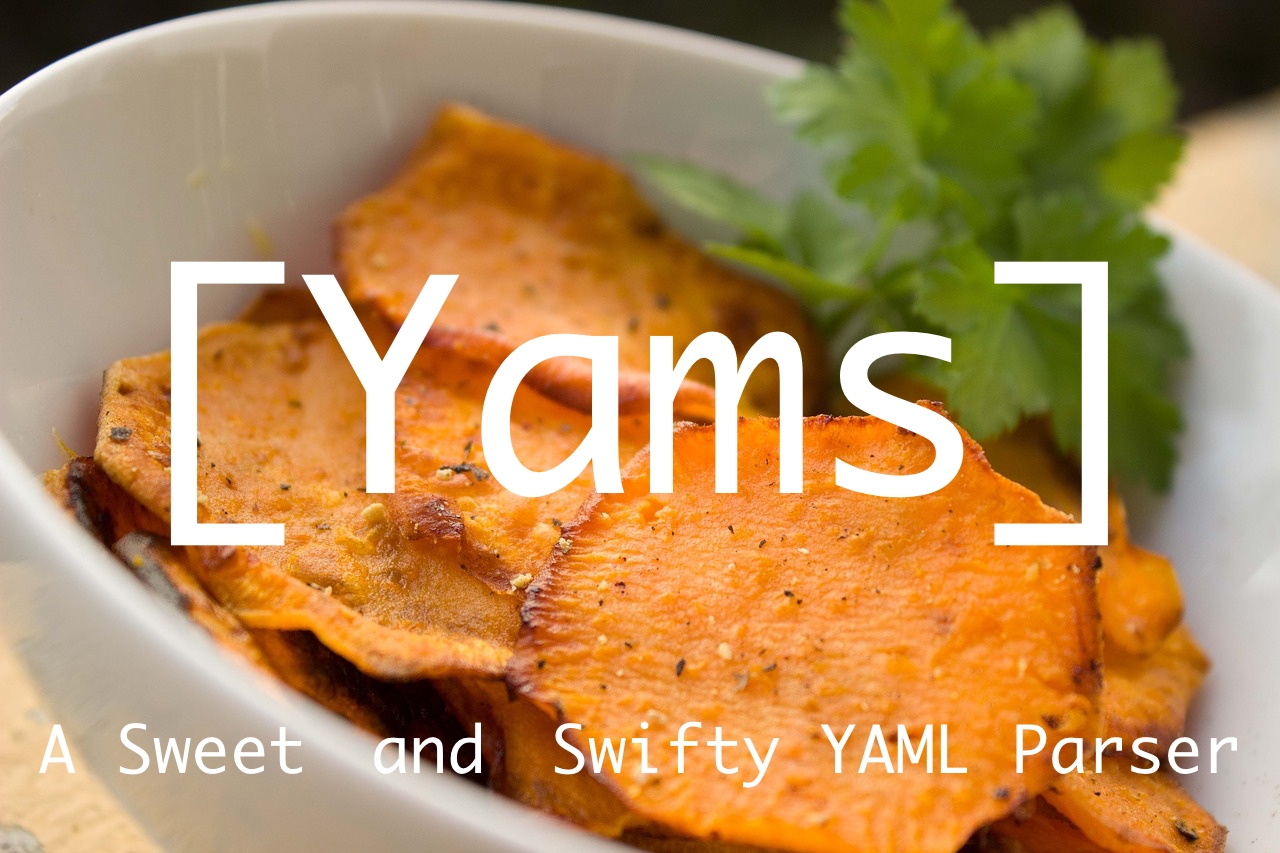

GitHub - jpsim/Yams: A Sweet and Swifty YAML parser.
source link: https://github.com/jpsim/Yams
Go to the source link to view the article. You can view the picture content, updated content and better typesetting reading experience. If the link is broken, please click the button below to view the snapshot at that time.
README.md
Yams
A sweet and swifty YAML parser built on LibYAML.
Installation
Building Yams on macOS requires Xcode 9.x or a Swift 3.2/4.x toolchain with the Swift Package Manager.
Building Yams on Linux requires a Swift 4.x compiler and Swift Package Manager to be installed.
Swift Package Manager
Add .package(url: "https://github.com/jpsim/Yams.git", from: "1.0.0") to your
Package.swift file's dependencies.
CocoaPods
Add pod 'Yams' to your Podfile.
Carthage
Add github "jpsim/Yams" to your Cartfile.
Usage
Yams has three groups of conversion APIs:
one for use with Codable types,
another for Swift Standard Library types,
and a third one for a Yams-native representation.
Codable types
- Codable is an encoding & decoding strategy introduced in Swift 4 enabling easy conversion between YAML and other Encoders like JSONEncoder and PropertyListEncoder.
- Lowest computational overhead, equivalent to
Yams.Node. - Encoding:
YAMLEncoder.encode(_:)Produces a YAMLStringfrom an instance of type conforming toEncodable. - Decoding:
YAMLDecoder.decode(_:from:)Decodes an instance of type conforming toDecodablefrom YAMLString.
import Foundation import Yams struct S: Codable { var p: String } let s = S(p: "test") let encoder = YAMLEncoder() let encodedYAML = try encoder.encode(s) encodedYAML == """ p: test """ let decoder = YAMLDecoder() let decoded = try decoder.decode(S.self, from: encodedYAML) s.p == decoded.p
Swift Standard Library types
- The type of Swift Standard Library is inferred from the contents of the
internal
Yams.Noderepresentation by matching regular expressions. - This method has the largest computational overhead When decoding YAML, because the type inference of all objects is done up-front.
- It may be easier to use in such a way as to handle objects created from
JSONSerializationor if the input is already standard library types (Any,Dictionary,Array, etc.). - Encoding:
Yams.dump(object:)Produces a YAMLStringfrom an instance of Swift Standard Library types. - Decoding:
Yams.load(yaml:)Produces an instance of Swift Standard Library types asAnyfrom YAMLString.
// [String: Any] let dictionary: [String: Any] = ["key": "value"] let mapYAML: String = try Yams.dump(object: dictionary) mapYAML == """ key: value """ let loadedDictionary = try Yams.load(yaml: mapYAML) as? [String: Any] // [Any] let array: [Int] = [1, 2, 3] let sequenceYAML: String = try Yams.dump(object: array) sequenceYAML == """ - 1 - 2 - 3 """ let loadedArray: [Int]? = try Yams.load(yaml: sequenceYAML) as? [Int] // Any let string = "string" let scalarYAML: String = try Yams.dump(object: string) scalarYAML == """ string """ let loadedString: String? = try Yams.load(yaml: scalarYAML) as? String
Yams.Node
- Yams' native model representing Nodes of YAML which provides all functions such as detection and customization of the YAML format.
- Depending on how it is used, computational overhead can be minimized.
- Encoding:
Yams.serialize(node:)Produces a YAMLStringfrom an instance ofNode. - Decoding
Yams.compose(yaml:)Produces an instance ofNodefrom YAMLString.
var map: Yams.Node = [ "array": [ 1, 2, 3 ] ] map.mapping?.style = .flow map["array"]?.sequence?.style = .flow let yaml = try Yams.serialize(node: map) yaml == """ {array: [1, 2, 3]} """ let node = try Yams.compose(yaml: yaml) map == node
License
Both Yams and libYAML are MIT licensed.
Recommend
About Joyk
Aggregate valuable and interesting links.
Joyk means Joy of geeK
